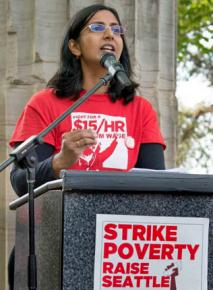Why are they targeting Sawant?
Freelance journalist looks at why a liberal civil rights organization has decided to challenge the most left-wing member of the City Council.
THE URBAN League is going after the only leftist and the only woman of color on the Seattle City Council. Rather than challenging the pro-corporate advocates of neoliberalism, whether Democrat or Republican, who increasingly dominate U.S. politics, this well-known liberal organization is expending its energy on defeating the left.
Pamela Banks, president of the Urban League of Metropolitan Seattle, announced this month that she will run in the next municipal election against City Council member Kshama Sawant, the Socialist Alternative candidate who won national attention for her successful 2013 campaign.
Sawant has been a leading figure in the Fight for 15 campaign, a national movement to demand demands a living minimum wage of $15 per hour. As Salon.com pointed out, she was one of the few officeholders in the U.S. to "openly and unapologetically criticize" Israel's war crimes against the Palestinian people. She is also in a virtual dead heat for the highest approval rating citywide of any City Council member, and has far and away the most name recognition, according to a poll published last October.

Because of her election success and her principled left-wing stands as a City Council member, Sawant has become an important symbol throughout the country that a democratic, anti-racist, feminist, socialist alternative to the Democratic Party is possible. Yet Banks and the Urban League want to pull down this symbol.
WHAT ARE Banks' critiques of Sawant? "I've learned over my career that you solve more problems with a telephone than a megaphone," she said. So the problem is that Sawant actually practices grassroots democracy? She leaves the local government back rooms and helps to mobilize grassroots activism among ordinary people, instead of making private phone calls to ask for tit-for-tat favors. That is apparently a bad thing.
Banks continued: "I won't be making rebuttals to the State of the Union," she explained. Now we see what is likely the Urban League's real problem with Sawant--this is about partisanship. Sawant publicly criticized the Obama administration's broken promises and concessions to the right, so she must be challenged for her defiance--even if that means weakening one of the only examples of progressive political independence in U.S. politics today.
"I don't think we differ much in our values," Banks admitted. "The biggest difference is how you get things done." If she doesn't differ much on values, why go after Sawant? There are eight other members she and the Urban League could work to unseat. Why not go after the more conservative members of the City Council? Why go after the most progressive (not to mention most prominent) member of the council?
The method of electing the City Council changed with the 2013 election. There will only be two at-large seats drawing votes from across the city. The most conservative council members will run in the newly created districts that represent the wealthier parts of town. Sawant has decided to run for office in District 3, and that's where Banks will aim to try to pull votes, along with two other candidates.
Still, the question remains: Why didn't the Urban League focus on any of the following City Council members:
Mike O'Brien, a businessman who, according to his own Council biography, "has spent most of his professional career working in financial management." He spent 10 years as the chief financial officer of the corporate law firm Stokes Lawrence, whose client list includes the likes of AT&T, Bank of America, T-Mobile, Toshiba, Wells Fargo, and more;
Sally Bagshaw, a business and finance lawyer;
Tom Rasmussen, a former deputy prosecuting attorney; or
Nick Licata, a former insurance broker and president of the Metropolitan Democratic Club.
Surely Kshama Sawant, an Indian-American Marxist feminist whose father died when she was 13 and who won office thanks to a groundbreaking grassroots campaign, will serve the interests of Seattle's most marginalized communities infinitely better than, say, a former financial officer of a corporate law firm that defended a racist bank that systematically saddled black Americans (whom its employees referred to as "mud people") with crippling subprime mortgages (which it referred to as "ghetto loans").
But Sawant is a socialist, so clearly, she must go!
In their challenge to Sawant, Pamela Banks and the Urban League are demonstrating that their allegiance to the Democratic Party and their relationships to the local elites in Seattle comes before defending the interests of people of color, women, and the working class.
This should not come as a surprise. When she was running for Seattle City Council, "all of the city's major Democratic Party organizations" opposed Sawant, as one news report put it. They instead endorsed her Democratic opponent Richard Conlin.
Liberals often accuse radicals of "dividing the left." Perhaps the best-known example came in the 2000 presidential election, when Green party candidate Ralph Nader was blamed for George W. Bush winning the White House, not Al Gore and his conservative, corporate-friendly policies--nor the outright election fraud in Florida that gave Bush his victory.
We can see from the example of Pamela Banks and the Urban League in Seattle that the opposite is true: The real dividers are the liberals who waste money, time and resources attacking a genuine leftist, on behalf of the corporate-controlled Democratic Party.


